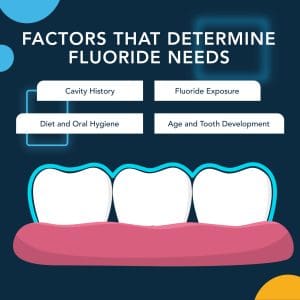Fluoride plays a vital role in protecting children’s teeth by strengthening tooth enamel and preventing tooth decay. While fluoride is found in toothpaste and drinking water, many parents wonder if professional fluoride treatments are necessary. In this article, we’ll break down the benefits, safety, and effectiveness of fluoride treatments so you can decide if they’re the right choice for your child’s oral health.
What is Flouride Varnish?
Fluoride varnish is a quick and painless dental treatment that helps strengthen tooth enamel and protect against cavities. It’s a safe, concentrated fluoride coating that a pediatric dentist applies directly to the teeth, where it hardens and gradually absorbs into the enamel. Unlike fluoride in toothpaste or drinking water, this treatment provides extra protection, especially for kids who are more prone to tooth decay.
What Happens During a Fluoride Treatment?
During a fluoride treatment, a pediatric dentist applies a concentrated fluoride varnish, gel, or foam directly to the teeth using a small brush or tray. The treatment takes just a few minutes and dries quickly, allowing the fluoride to absorb into the enamel. Kids may be asked to avoid eating or drinking for a short time afterward, but otherwise, it’s an easy and effective way to keep their teeth strong and aid in cavity prevention.
What are the Benefits of Fluoride for Children?
Fluoride is one of the best tools for keeping kids’ teeth strong and cavity-free. It helps protect tooth enamel, prevents tooth decay, and supports healthy oral development. While daily brushing with fluoride toothpaste is important, professional fluoride treatments offer extra protection, especially for children who may be more prone to cavities. In the following sections, we’ll take a closer look at how fluoride benefits your child’s dental health and why it’s recommended by dentists.
Strengthening Developing Teeth
Dental fluoride plays a key role in strengthening developing teeth by making tooth enamel more resistant to acid and bacteria. As children’s permanent teeth grow in, fluoride helps reinforce them from the inside out, reducing the risk of weak spots and early decay. This extra layer of protection ensures that their teeth stay strong as they continue to develop good oral hygiene habits.
Preventing Cavities and Tooth Decay
Cavities are one of the most common dental issues in kids, but fluoride treatments help prevent them by blocking acid attacks and slowing down enamel erosion. Fluoride strengthens teeth and repairs early signs of tooth decay before cavities can form. Combined with brushing, flossing, and regular dental visits, fluoride provides an extra shield against bacteria and plaque buildup.
Long-Term Protection Against Oral Health Issues
A strong foundation in dental health during childhood leads to healthier teeth in adulthood. Fluoride helps prevent tooth decay, reducing the need for fillings, crowns, or more extensive treatments later in life. By reinforcing tooth enamel early on, fluoride treatments can lower the risk of gum disease, enamel wear, and tooth loss, setting the stage for a lifetime of healthy smiles.
Factors That Determine Fluoride Needs
Not every child needs the same amount of fluoride; it depends on their oral health, diet, and daily habits. Some kids naturally get enough fluoride from toothpaste and drinking water, while others may benefit from professional fluoride treatments for extra protection against cavities. Understanding the key factors that influence fluoride needs can help you make the best decision for your child’s dental health.
Cavity History and Risk of Tooth Decay
Children who have had cavities before or are prone to tooth decay may benefit from additional fluoride treatments. If your child has a history of frequent dental issues, their dentist may recommend professional fluoride applications as an added layer of protection.
Fluoride Exposure from Water and Toothpaste
Many communities add fluoride to drinking water, which can help strengthen teeth naturally. Kids who regularly drink fluoridated water and use fluoride toothpaste may already get enough protection. However, if your area doesn’t have fluoridated water or your child isn’t using fluoride products, professional treatments can help ensure they receive the right amount to prevent tooth decay.
Diet and Oral Hygiene Habits
A child’s diet plays a big role in their cavity risk. Frequent consumption of sugary or acidic foods can weaken tooth enamel, making fluoride even more important. Similarly, children who struggle with brushing and flossing properly may not remove plaque effectively, increasing their risk of cavities. In these cases, fluoride treatments can provide extra defense against decay.
Age and Tooth Development
Fluoride is especially important during tooth development, as it helps build strong enamel on both baby teeth and permanent teeth. Younger children with developing teeth may benefit more from fluoride varnish treatments, while older kids and teens may rely on fluoride toothpaste and water for protection. A pediatric dentist can determine the right fluoride plan based on your child’s age and needs.
Are Fluoride Treatments Safe for Kids?
Fluoride treatments are considered safe and effective for children when used appropriately. Dentists and health experts, including the American Dental Association (ADA) and the Centers for Disease Control and Prevention (CDC), recommend fluoride to help prevent tooth decay and strengthen tooth enamel. Professional fluoride applications contain carefully measured amounts to provide benefits while minimizing any risk. When used as directed, whether in toothpaste, drinking water, or professional treatments, fluoride is a safe way to support your child’s oral health and prevent future dental problems.
What are the Risks of Fluoride Treatment?
While fluoride treatments are generally safe and highly effective, excessive fluoride exposure can pose some risks. Most concerns come from overuse rather than professional applications, which are carefully measured for safety. Understanding potential risks, such as fluorosis, sensitivity, or accidental ingestion, can help ensure your child gets the right amount of fluoride for strong, healthy teeth without unnecessary side effects.
Fluorosis and Tooth Discoloration
Fluorosis occurs when a child gets too much fluoride while their permanent teeth are still developing. It typically appears as white spots or streaks on the enamel. While mild fluorosis is harmless, excessive fluoride exposure can lead to more noticeable discoloration. Using age-appropriate fluoride toothpaste and following dentist recommendations helps prevent this while still protecting against tooth decay.
Potential for Overexposure to Fluoride
Too much fluoride from multiple sources (drinking water, toothpaste, supplements, or treatments) can lead to overexposure. While professional fluoride treatments are carefully measured, excessive use of fluoride products at home can increase risk. Parents should monitor fluoride intake, ensuring kids use only a pea-sized amount of toothpaste and avoid unnecessary supplements if their water is already fluoridated.
Temporary Tooth Sensitivity After Fluoride Treatments
Some children may experience mild tooth sensitivity after a fluoride treatment, especially if they already have weakened enamel or sensitive teeth. This discomfort is usually temporary and fades within a day. Avoiding hot, cold, or acidic foods immediately after treatment can help minimize sensitivity, and a pediatric dentist can recommend solutions if discomfort persists.
Safety Concerns with Swallowing Fluoride
Swallowing large amounts of fluoride, especially from toothpaste or treatments, can lead to an upset stomach or, in extreme cases, fluoride toxicity. This is why dentists use controlled amounts in professional fluoride applications and advise parents to supervise brushing. Teaching children to spit out toothpaste instead of swallowing helps ensure they get the benefits of fluoride safely.
How to Maintain Your Child’s Oral Health After Fluoride Treatments
Fluoride treatments provide a strong defense against cavities, but maintaining your child’s oral health goes beyond just one visit to the dentist. Good daily habits, a balanced diet, and regular dental checkups all play a role in keeping their teeth strong and healthy. By reinforcing proper oral hygiene and making smart choices, you can help maximize the benefits of fluoride treatments and protect their smile for years to come.
Encouraging Daily Oral Hygiene Habits
Good oral hygiene is essential for keeping your child’s teeth strong after a fluoride treatment. Encourage them to brush twice a day with fluoride toothpaste, floss daily, and rinse with water after meals. Making brushing fun by using a timer, music, or reward chart can help build lifelong habits that protect their tooth enamel from cavities.
Choosing the Right Foods for Strong Teeth
A tooth-friendly diet supports fluoride treatments by keeping teeth strong and preventing cavities. It’s important to include foods rich in calcium, phosphorus, and vitamin D, such as dairy products, leafy greens, and nuts. Additionally, limiting sugary snacks and acidic beverages can help protect tooth enamel. Offering crunchy fruits and vegetables, like apples and carrots, also helps to naturally clean teeth and promote good oral health.
Keeping Up with Regular Dental Visits
Regular dental checkups are important for monitoring your child’s tooth development, assessing fluoride levels, and identifying potential issues early on. Routine cleanings help remove plaque buildup and keep their smile healthy. If necessary, your dentist near me can also recommend additional fluoride treatments. By scheduling visits every six months, you ensure that your child receives the best preventive dental care possible.
Schedule Your Next Dental Checkup Today
Fluoride treatments are a great way to protect your child’s teeth from cavities, but regular dental checkups are just as important for maintaining their oral health. A pediatric dentist in Davie, Florida can monitor fluoride levels, check for early signs of tooth decay, and ensure your child’s teeth are developing properly. Routine visits also reinforce good oral hygiene habits and provide professional cleanings for long-term protection. Schedule an appointment with a Davie dentist today to keep your child’s smile strong, healthy, and cavity-free!
May 2, 2025

 Adult
Adult




